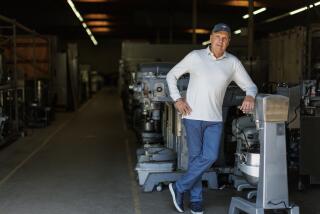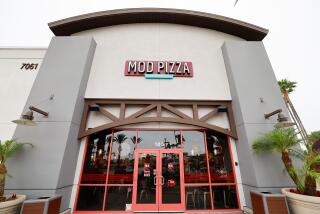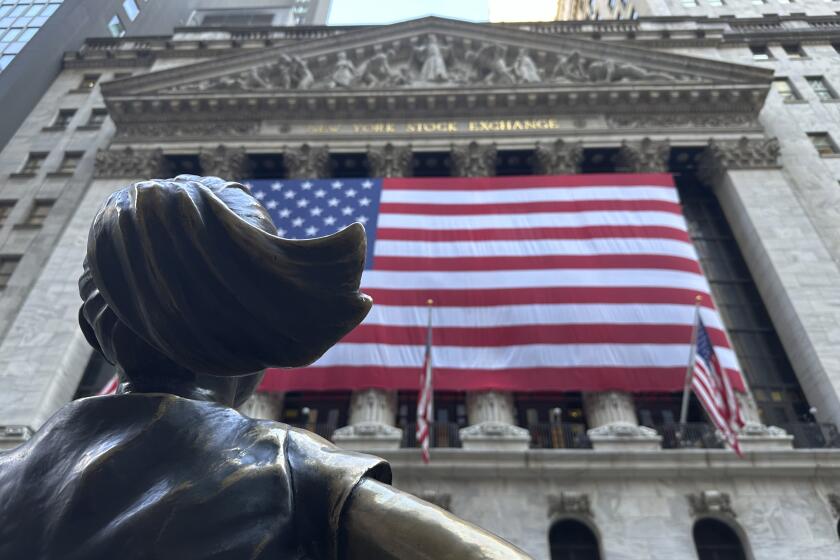A Takeover That Ended a Friendship : Pioneer Take-Out Founder, Purchaser at Odds Over Terms
A year ago, H. R. Kaufman, founder and owner of Pioneer Take-Out, turned to his friend and business associate Terrence P. Goggin for help with his troubled fried chicken chain.
Faced with declining sales and discontented franchisees, Kaufman hired Goggin, an attorney and former California assemblyman from San Bernardino, to help find a buyer for the chain he started with one outlet in Echo Park 27 years ago.
As it turned out, Goggin and a group of investors agreed to buy the Los Angeles company last month. But today the deal is in shambles as Kaufman and Goggin battle for control of the embattled company. And last week Pioneer filed for protection from creditors under Chapter 11 of federal bankruptcy laws.
Caught in the middle are the company’s 220 franchise owners, many of them immigrant entrepreneurs, some of whom paid a minimum of $250,000 to become part of the chain. “They are scared to death,” says Marilyn Lu Gordon, who owns a Pioneer outlet in Highland Park. “They don’t know how it is going to affect them. They are concerned about the future of the company and if it is going to stay in business.”
Long disgruntled, the franchisees had high hopes for the sale of Pioneer when it was announced in early December.
At the time, it seemed like a good deal for all involved: Kaufman would receive $5 million over a period of time, plus interest. The Goggin group expected to earn a hefty profit by taking the 270-store chain public in a few years. And many franchisees relished the prospect of new management and promises of increased advertising budgets.
But the plan to rebuild Pioneer quickly fell apart.
A disagreement about rent money for Pioneer outlets quickly escalated. Goggin withheld certain payments to Kaufman. In return, Kaufman locked Goggin out of the company’s Mid-Wilshire headquarters and declared himself back in control at Pioneer. Goggin disputes Kaufman’s contentions, and both sides have appealed to the franchisees for support.
Kaufman is telling Pioneer franchisees that he is the rightful owner. So is Goggin.
Some franchisees say they are ignoring both Goggin and Kaufman. They are paying rents directly to landlords and withholding royalty payments. They continue to pay suppliers directly for their food and other supplies.
“I don’t consider either of them as the rightful owner because they haven’t got the judge’s ruling,” says Howard Liu, who operates a Pioneer outlet in Torrance.
“We cannot leave because, No. 1, if we leave the store, we lose too much. And No. 2., there is no way we can promote this business on our own. So we are stuck,” Liu said. “We can’t go forward. We’re depending on the legal system to give us fair treatment.”
Pioneer recently has suffered from intense competition in the fast food industry. While the chain focused its expansion on the regional market, national competitors like Kentucky Fried Chicken and Church’s expanded, adding new products along the way and using their large number of outlets to embark on costly advertising programs to draw in customers.
Pioneer also cut back on advertising, which is considered crucial in the fast-food business, even though franchisees continued to pay into an ad fund. The lack of advertising hurt sales which were already on the decline. In addition, Pioneer seemed to fall behind in introducing new menu items, like low-fat broiled chicken to appeal to health conscious consumers. Meanwhile, McDonald’s introduced its highly successful Chicken McNuggets as Pioneer was getting battered from old rivals like Kentucky Fried Chicken and new ones like El Pollo Loco.
Meanwhile, Kaufman was pursuing other investments as well. The chicken chain’s early success gave him the riches to pursue other investments, and real estate was a favorite. He became more involved with the multimillion-dollar real estate development of Blue Jay near Lake Arrowhead; the troubled Arrowhead Pacific Savings Bank, and other investments, according to a group of franchisees.
Company in Turmoil
“The management got more involved in real estate ventures than restaurant operations,” said Janet Lowder, manager of the restaurant consulting group at Laventhol & Horwath in Los Angeles.
The franchisees sued Pioneer and Kaufman last year, alleging that he issued fraudulent information to sell them franchises and inappropriately used money from Pioneer to finance his other investments. The lawsuit is still pending, and Kaufman has denied the charges.
It was the increasing discontent among franchisees, many of whom withheld royalty payments, that led Kaufman to put cash-strapped Pioneer up for sale. Goggin was one of three prospective buyers, according to company insiders.
Goggin became very familiar with Pioneer because he helped Kaufman clear up some Pioneer troubles last summer with the Internal Revenue Service and the California Department of Corporations. The IRS was seeking overdue taxes, while the California agency raised questions about the legality of Pioneer continuing to sell franchises when the chain appeared to have “liquidity problems.”
Goggin said in a recent interview that Pioneer lost $2 million during the first 10 months of 1987. The losses were mostly the result of disgruntled franchisees who withheld royalty payments from Pioneer, he said.
In addition, Goggin said, Pioneer owed $1.5 million in back taxes and was behind $1.3 million in store rents. Another $1.5 million was owed to the Commercial Mercantile Bank.
Management Upheaval
Despite all the problems, Goggin saw potential for the chain. “The company has fundamentally a good name in this town,” he said. ‘It’s got well-placed stores” with relatively inexpensive long-term leases.
The Goggin group had pledged to infuse Pioneer with $8.1 million--$6.6 million in borrowed money and $1.5 million from New York investor Peter Lusk. Kaufman was to receive $5 million plus interest, payable in monthly installments. Kaufman also was entitled to certain profits from a sale of common stock to the public.
Shortly after taking over, Goggin’s group laid off 17 of the 65 corporate staff people and cut executive salaries by 30%.
The new management hired Goggin’s wife, Susan McCabe, a real estate expert and member of the California Coastal Commission, at an annual salary of $65,000 to handle Pioneer’s real estate and lease activities. Goggin’s former campaign manager, John Husing, took the position as interim director of operations at $100,000 a year. Goggin’s salary was set at $150,000 a year.
Goggin said the new staff soon discovered an additional $1.3 million owed in back rent. Nearly 100 store sites were in immediate danger of being taken back by their landlords, Goggin said.
On the day that Kaufman posted armed guards to keep Goggin out of Pioneer’s company headquarters, franchisee Satish Desai said he was in court in Torrance defending his Pioneer outlet against his landlord who wants him out because of back rent that was not paid by Pioneer.
He said in an interview that he paid rent to Pioneer, as required, but the money was allegedly not forwarded to the landlord.
sh Ill Will Escalates
Goggin said he estimated that it would cost about $1.2 million to defend the leases--Pioneer’s major assets. As a result, he said he withheld a $100,000 payment to Kaufman called for in their sales agreement. Goggin said he was entitled to use the $100,000 to offset the unexpected back rent payments.
“We didn’t expect the golden goose,” Goggin said. “But we expected something that was functioning properly.”
The two met Dec. 17 to discuss the back rents, but no agreement was reached. Kaufman agreed to a meeting on Jan. 4 after he returned from a holiday vacation in the Caribbean, but the meeting never took place. During New Year’s weekend, Kaufman, who owns the three-story Pioneer headquarters building, changed the locks and posted guards to keep Goggin and his staff out.
Kaufman refused repeated requests for an interview for this story. Through a spokesman, he referred questions to his lawyers.
Kaufman acted properly in canceling the agreement, the lawyers said, because the Goggin group failed to come up with $1.5 million in cash from Lusk and because he missed a required payment of $100,000. Furthermore, Kaufman’s attorney charged that Goggin’s staff failed to make rent payments due during the period Goggin was in control.
“Not so much as five cents was paid for the purchase of Pioneer,” said Leonard Venger, an attorney representing Kaufman. Venger said Goggin was aware of the total amount of rents that were yet to be paid. “He knew the company backward and forward. To say otherwise is utterly unbelievable.”
Kaufman and Goggin, who were once seen together at cocktail parties and in the mountain towns of Lake Arrowhead and Blue Jay, will have their next standoff in bankruptcy court. “We were social friends,” Goggin said.
Serious Money Woes
In their letters to franchisees, the two have zeroed in on the back rents. Kaufman claimed that Pioneer, under Goggin’s management, paid $26,000 to Goggin’s personal trust: Flynn Ranch Trust. Goggin says the money was for part of the $100,000 worth of legal services he performed for Pioneer during 1987.
Goggin’s problems with Pioneer have brought his personal financial problems into the spotlight. “If you owe a lot of money the best thing to do is to make a lot of money so you can pay it off,” said Goggin.
He has a string of court judgments pending against him for failure to pay bank loans and defaulting on payments to contractors. The five-term state assemblyman was also fined $13,000 by the state Fair Political Practices Commission in a longstanding financial disclosure dispute.
His failure to pay off the debts, Goggin says, stems from campaign expenses. “I went broke in politics,” said Goggin, who represented the 66th Assembly District in San Bernardino from 1974 to 1984. “I have been struggling to pay off bank loans for several years now.”
Meanwhile, Kaufman has financial problems of his own at Pioneer. One week after he took Pioneer back, the California Board of Equalization sought to recover taxes from Pioneer.
Meanwhile, some Pioneer franchisees say that they are looking to bankruptcy court for help in straightening out their difficulties. “I just hope somehow the franchisees will survive,” Liu adds.
More to Read
Inside the business of entertainment
The Wide Shot brings you news, analysis and insights on everything from streaming wars to production — and what it all means for the future.
You may occasionally receive promotional content from the Los Angeles Times.






